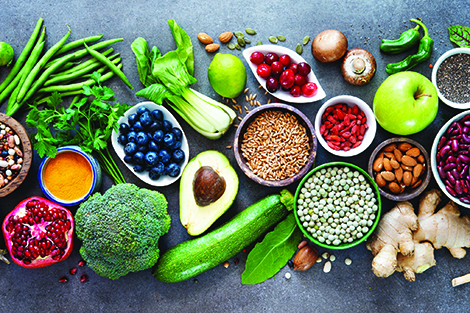You are what you eat when it comes to skin-deep affects of aging
That old adage “You are what you eat†applies to your skin. Nicolette Pace, a dietician and nutritionist who has been featured on television and in magazines, notes, “Good skin relies on an adequate supply of essential nutrients. Some studies indicate that it’s indeed possible to delay aging and get an improvement in skin condition by improving your diet.â€
And improving it can be as easy as eating certain key food that can help with everything from wrinkles to dark spots to sagging skin. You won’t believe how good fighting aging can taste, Pace testifies.
Tomatoes
They’re so much more than a pretty salad topping. They’re packed with vitamin C, which helps build collagen and makes skin look firmer and plumper. They also have lycopene, which protects skin from UV (ultraviolet) damage and improves your vascular system. According to Pace, after six weeks of eating tomatoes regularly, all that extra circulation will give you a noticeable glow.
Berries
Blueberries and raspberries are Pace’s top picks. They contain flavonoids, polyphenols, vitamins, probiotics, and tons of antioxidants. If you’re concerned with the effect your environment — anything from pollution to elements in your water — is having on your skin, add more berries to your diet. “They can even promote cell regeneration for new skin,†said Pace.
Green tea
In order to keep skin looking as young as possible for as long as possible, the cells need to regenerate correctly. (Cells that mutate can lead to everything from uneven pigmentation to cancer.) “Green tea has lots of antioxidant power, as well as a chemical call EGCG,†said Pace. “In multiple studies, it was shown to help cells grow properly and maintain a healthy life cycle.â€
Yogurt and Kefir
To fight redness and irritation, Pace recommends introducing foods with more probiotics, like yogurt, into your diet. Their “skin-friendly†condition skin “inside and out,†Pace said. Look for natural, unprocessed products to get the highest concentration of living probiotics. Kefir is a cultured milk product that’s similar to yogurt, but has up to three times more probiotics than yogurt. You’ll find it in the dairy case where it’s often sold as a drink, thanks to its thinner consistency. While medical researchers are still figuring out the link between gut bacteria and skin, studies have shown that probiotics reduce inflammation and oxidative stress. Problems like acne, psoriasis, atopic dermatitis, and rosacea may all improve.
Fish
If your skin is chronically dry, add healthy fats to your diet. They help moisturize skin from the inside out. Wild salmon, for instance, is high in omega-3 fatty acids, one of the best fats . Other omega-rich fish include sardines and Atlantic mackerel.
Nuts
Nuts are another source of good fat. Their anti-inflammatory properties can help with conditions like acne, psoriasis, and eczema. While walnuts contain the most omega-3s, all nuts, including almonds, hazelnuts, peanuts, and pistachios, are good for health when eaten in moderation. Instead of a handful of chips when you feel hungry, eat a handful of mixed nuts to see the skin-smoothing benefits.
Avocados
Like nuts and fish, avocados have a lot of good-for-you (your skin included) fat. They are also high in glutathione. By flushing toxins from your system, glutathione helps with acne and wrinkles and slows the development of certain cancers.

If you’re craving something sweet, honey is better for you than other types of sugar. Honey is anti-viral and an antioxidant, and it doesn’t cause inflammation in the body and skin the way regular sugar does.
